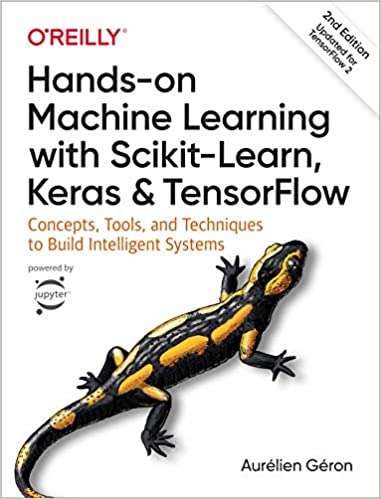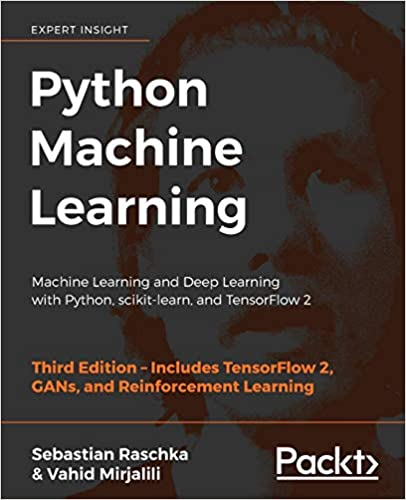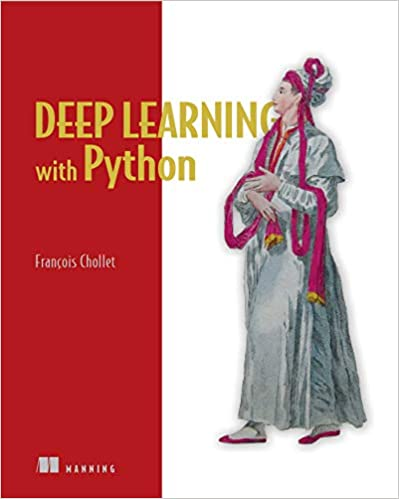One of the best steps I’ve taken as a Software Engineer has been to get into Machine Learning.
If you are looking for what& #39;s next in your career, here are some pointers to get you started: https://abs.twimg.com/emoji/v2/... draggable="false" alt="🧵" title="Thread" aria-label="Emoji: Thread">
https://abs.twimg.com/emoji/v2/... draggable="false" alt="🧵" title="Thread" aria-label="Emoji: Thread"> https://abs.twimg.com/emoji/v2/... draggable="false" alt="👇" title="Rückhand Zeigefinger nach unten" aria-label="Emoji: Rückhand Zeigefinger nach unten">
https://abs.twimg.com/emoji/v2/... draggable="false" alt="👇" title="Rückhand Zeigefinger nach unten" aria-label="Emoji: Rückhand Zeigefinger nach unten">
If you are looking for what& #39;s next in your career, here are some pointers to get you started:
I always answer “what would you recommend next?” with "Machine Learning."
Here is why:
 https://abs.twimg.com/emoji/v2/... draggable="false" alt="1⃣" title="Tastenkappe Ziffer 1" aria-label="Emoji: Tastenkappe Ziffer 1"> Not only we are barely touching the surface of how Machine Learning will transform our lives in the next 10 years, but the need for qualified professionals will continue to rise.
https://abs.twimg.com/emoji/v2/... draggable="false" alt="1⃣" title="Tastenkappe Ziffer 1" aria-label="Emoji: Tastenkappe Ziffer 1"> Not only we are barely touching the surface of how Machine Learning will transform our lives in the next 10 years, but the need for qualified professionals will continue to rise.
 https://abs.twimg.com/emoji/v2/... draggable="false" alt="👇" title="Rückhand Zeigefinger nach unten" aria-label="Emoji: Rückhand Zeigefinger nach unten">
https://abs.twimg.com/emoji/v2/... draggable="false" alt="👇" title="Rückhand Zeigefinger nach unten" aria-label="Emoji: Rückhand Zeigefinger nach unten">
Here is why:
So, how do you get started? How can you start from the very beginning?
 https://abs.twimg.com/emoji/v2/... draggable="false" alt="1⃣" title="Tastenkappe Ziffer 1" aria-label="Emoji: Tastenkappe Ziffer 1"> Learn Python
https://abs.twimg.com/emoji/v2/... draggable="false" alt="1⃣" title="Tastenkappe Ziffer 1" aria-label="Emoji: Tastenkappe Ziffer 1"> Learn Python  https://abs.twimg.com/emoji/v2/... draggable="false" alt="🐍" title="Schlange" aria-label="Emoji: Schlange">.
https://abs.twimg.com/emoji/v2/... draggable="false" alt="🐍" title="Schlange" aria-label="Emoji: Schlange">.
Yes, I know you don& #39;t have to, but I& #39;d recommend you do it.
Python is the motor behind most popular Machine Learning libraries so you don& #39;t want to ignore it.
 https://abs.twimg.com/emoji/v2/... draggable="false" alt="👇" title="Rückhand Zeigefinger nach unten" aria-label="Emoji: Rückhand Zeigefinger nach unten">
https://abs.twimg.com/emoji/v2/... draggable="false" alt="👇" title="Rückhand Zeigefinger nach unten" aria-label="Emoji: Rückhand Zeigefinger nach unten">
Yes, I know you don& #39;t have to, but I& #39;d recommend you do it.
Python is the motor behind most popular Machine Learning libraries so you don& #39;t want to ignore it.
Both NumPy and pandas are popular Python libraries, and you& #39;ll have to use them constantly during your career.
These libraries aren& #39;t limited to ML applications, so you have nothing to lose by getting familiar with them.
1. Define the Problem
2. Prepare Data
3. Spot Check Algorithms
4. Improve Results
5. Present Results
Check this article: https://machinelearningmastery.com/process-for-working-through-machine-learning-problems/">https://machinelearningmastery.com/process-f... from @TeachTheMachine
Weka will let you apply a lot of different algorithms to your data without writing a single line of code.
Even better: Weka will generate code for you!
Here is the list I started with:
1. Linear regression
2. Logistic regression
3. Decision Trees
4. Neural Networks
5. K-NN
6. SVM
Check out the following libraries (besides NumPy and pandas which you already know):
1. SciPy
2. Matplotlib
3. Scikit-learn
With these, you should be able to use all the algorithms in code.
How can you apply some of this new knowledge to a real problem? It doesn& #39;t have to be innovative, but try to build an end to end solution using your new skills.
Deep Learning is usually the backbone of most "cool" applications of Machine Learning you hear about.
Libraries like TensorFlow and PyTorch will be the foundation of everything you& #39;ll do here.
There& #39;s a lot you can do, and although this is not necessary, I& #39;d recommend you focus on an area and go all-in on it.
I focus on Computer Vision.
I have a lot of friends that focus on Natural Language Processing.
If you get here, you probably want to ensure most of your time focuses on your new skillset.
Find a new job, or move to a position that exposes you to the field.
There will be many opportunities waiting for you.
Here are some courses I& #39;d recommend you check out:
- Linear Algebra (MIT)
- Machine Learning ( @AndrewYNg - Coursera)
- Deep Learning ( @AndrewYNg - Coursera)
- TensorFlow In Practice (Coursera)
- Stanford Computer Vision ( @drfeifei - YouTube)
 https://abs.twimg.com/emoji/v2/... draggable="false" alt="👇" title="Rückhand Zeigefinger nach unten" aria-label="Emoji: Rückhand Zeigefinger nach unten">
https://abs.twimg.com/emoji/v2/... draggable="false" alt="👇" title="Rückhand Zeigefinger nach unten" aria-label="Emoji: Rückhand Zeigefinger nach unten">
- Linear Algebra (MIT)
- Machine Learning ( @AndrewYNg - Coursera)
- Deep Learning ( @AndrewYNg - Coursera)
- TensorFlow In Practice (Coursera)
- Stanford Computer Vision ( @drfeifei - YouTube)
And here are three books:
1. Hands-On Machine Learning with Scikit-Learn, Keras, and TensorFlow
2. Machine Learning and Deep Learning with Python
3. Deep Learning with Python
 https://abs.twimg.com/emoji/v2/... draggable="false" alt="👇" title="Rückhand Zeigefinger nach unten" aria-label="Emoji: Rückhand Zeigefinger nach unten">
https://abs.twimg.com/emoji/v2/... draggable="false" alt="👇" title="Rückhand Zeigefinger nach unten" aria-label="Emoji: Rückhand Zeigefinger nach unten">
1. Hands-On Machine Learning with Scikit-Learn, Keras, and TensorFlow
2. Machine Learning and Deep Learning with Python
3. Deep Learning with Python
If you are into podcasts, here are the ones I listen to:
1. Data Science Imposters
2. Data Skeptic
3. DataTalk
4. Linear Digressions
5. Machine Learning - Software Engineering Daily
 https://abs.twimg.com/emoji/v2/... draggable="false" alt="👇" title="Rückhand Zeigefinger nach unten" aria-label="Emoji: Rückhand Zeigefinger nach unten">
https://abs.twimg.com/emoji/v2/... draggable="false" alt="👇" title="Rückhand Zeigefinger nach unten" aria-label="Emoji: Rückhand Zeigefinger nach unten">
1. Data Science Imposters
2. Data Skeptic
3. DataTalk
4. Linear Digressions
5. Machine Learning - Software Engineering Daily
And finally, here are some accounts here on Twitter that you should follow if you are in this field:
- @AndrewYNg
- @fchollet
- @chipro
- @karpathy
- @TeachTheMachine
- @kdnuggets
- @KirkDBorne
- @hmason
- @drfeifei
And my friends:
- @AlejandroPiad
- @haltakov
- @yudivian
- @AndrewYNg
- @fchollet
- @chipro
- @karpathy
- @TeachTheMachine
- @kdnuggets
- @KirkDBorne
- @hmason
- @drfeifei
And my friends:
- @AlejandroPiad
- @haltakov
- @yudivian

 Read on Twitter
Read on Twitter " title="And here are three books:1. Hands-On Machine Learning with Scikit-Learn, Keras, and TensorFlow2. Machine Learning and Deep Learning with Python3. Deep Learning with Pythonhttps://abs.twimg.com/emoji/v2/... draggable="false" alt="👇" title="Rückhand Zeigefinger nach unten" aria-label="Emoji: Rückhand Zeigefinger nach unten">">
" title="And here are three books:1. Hands-On Machine Learning with Scikit-Learn, Keras, and TensorFlow2. Machine Learning and Deep Learning with Python3. Deep Learning with Pythonhttps://abs.twimg.com/emoji/v2/... draggable="false" alt="👇" title="Rückhand Zeigefinger nach unten" aria-label="Emoji: Rückhand Zeigefinger nach unten">">
 " title="And here are three books:1. Hands-On Machine Learning with Scikit-Learn, Keras, and TensorFlow2. Machine Learning and Deep Learning with Python3. Deep Learning with Pythonhttps://abs.twimg.com/emoji/v2/... draggable="false" alt="👇" title="Rückhand Zeigefinger nach unten" aria-label="Emoji: Rückhand Zeigefinger nach unten">">
" title="And here are three books:1. Hands-On Machine Learning with Scikit-Learn, Keras, and TensorFlow2. Machine Learning and Deep Learning with Python3. Deep Learning with Pythonhttps://abs.twimg.com/emoji/v2/... draggable="false" alt="👇" title="Rückhand Zeigefinger nach unten" aria-label="Emoji: Rückhand Zeigefinger nach unten">">
 " title="And here are three books:1. Hands-On Machine Learning with Scikit-Learn, Keras, and TensorFlow2. Machine Learning and Deep Learning with Python3. Deep Learning with Pythonhttps://abs.twimg.com/emoji/v2/... draggable="false" alt="👇" title="Rückhand Zeigefinger nach unten" aria-label="Emoji: Rückhand Zeigefinger nach unten">">
" title="And here are three books:1. Hands-On Machine Learning with Scikit-Learn, Keras, and TensorFlow2. Machine Learning and Deep Learning with Python3. Deep Learning with Pythonhttps://abs.twimg.com/emoji/v2/... draggable="false" alt="👇" title="Rückhand Zeigefinger nach unten" aria-label="Emoji: Rückhand Zeigefinger nach unten">">


